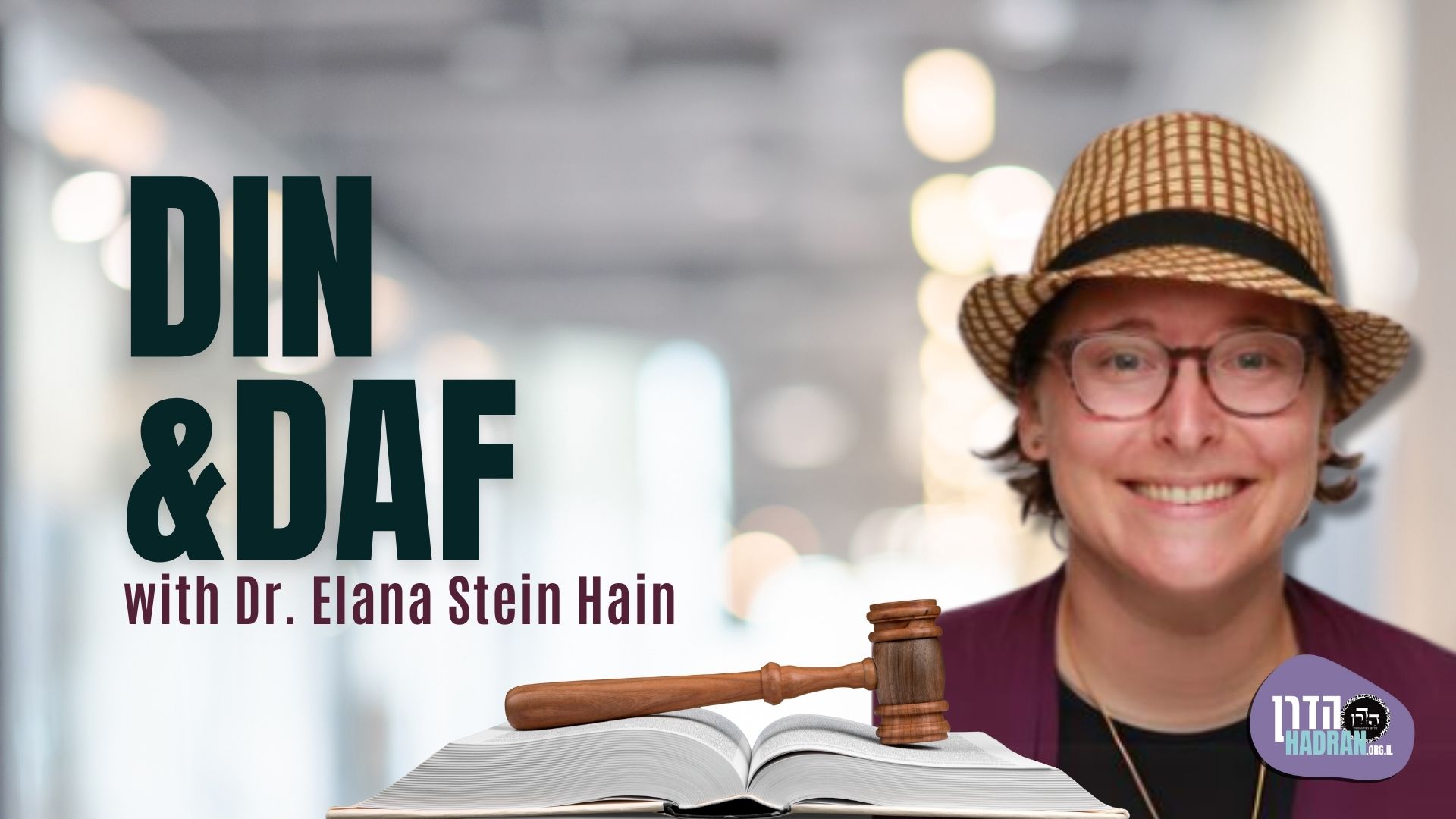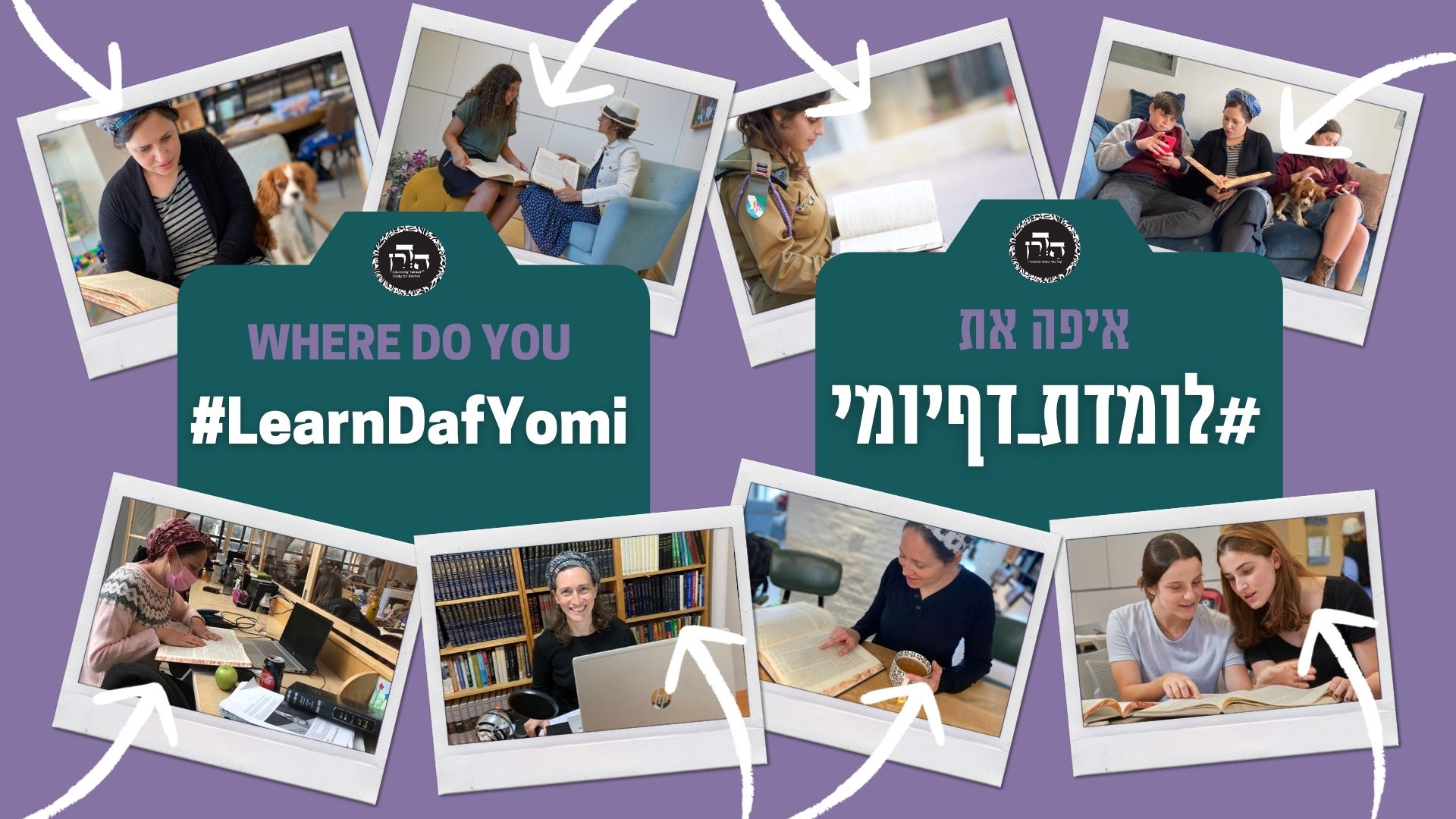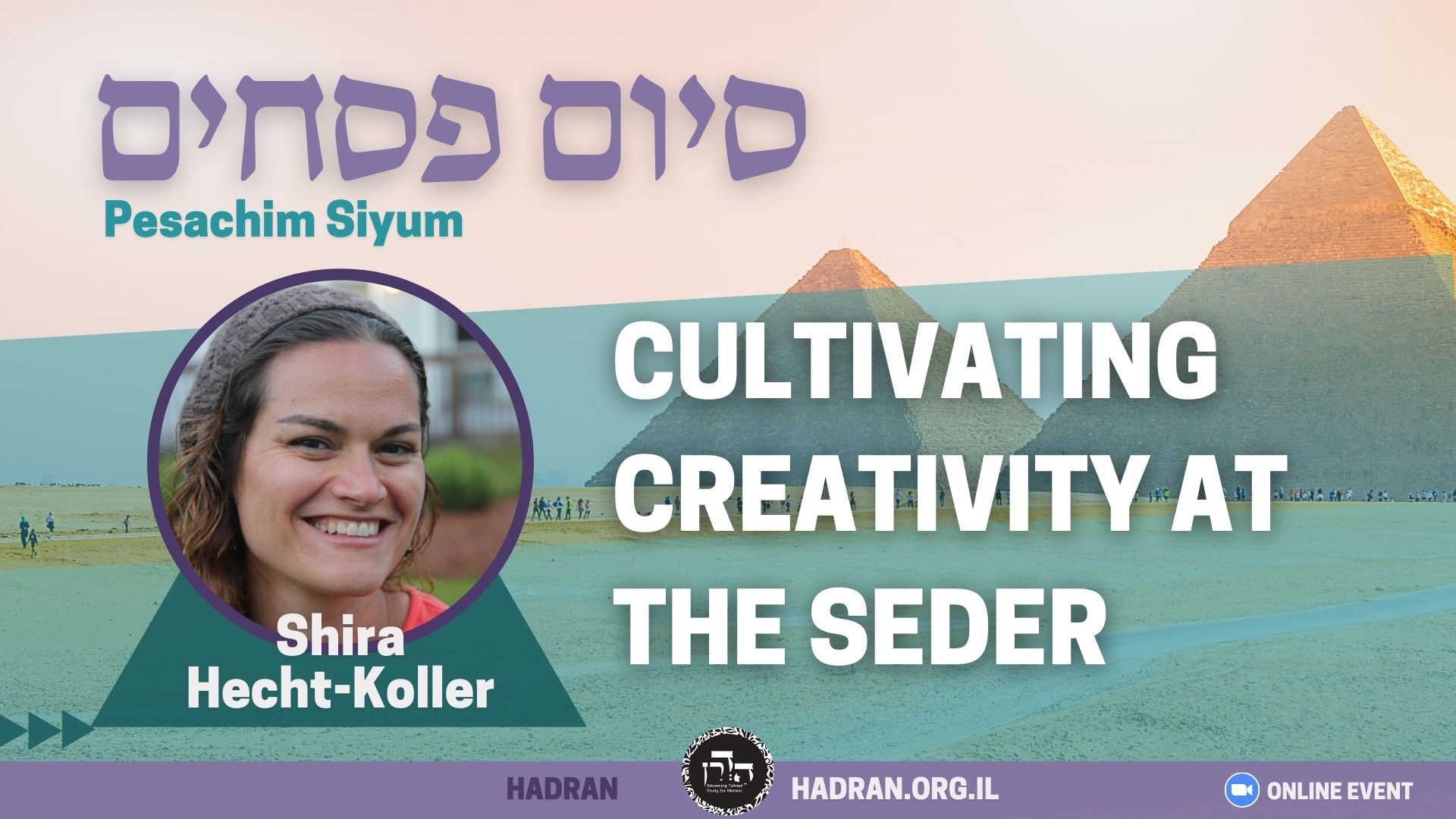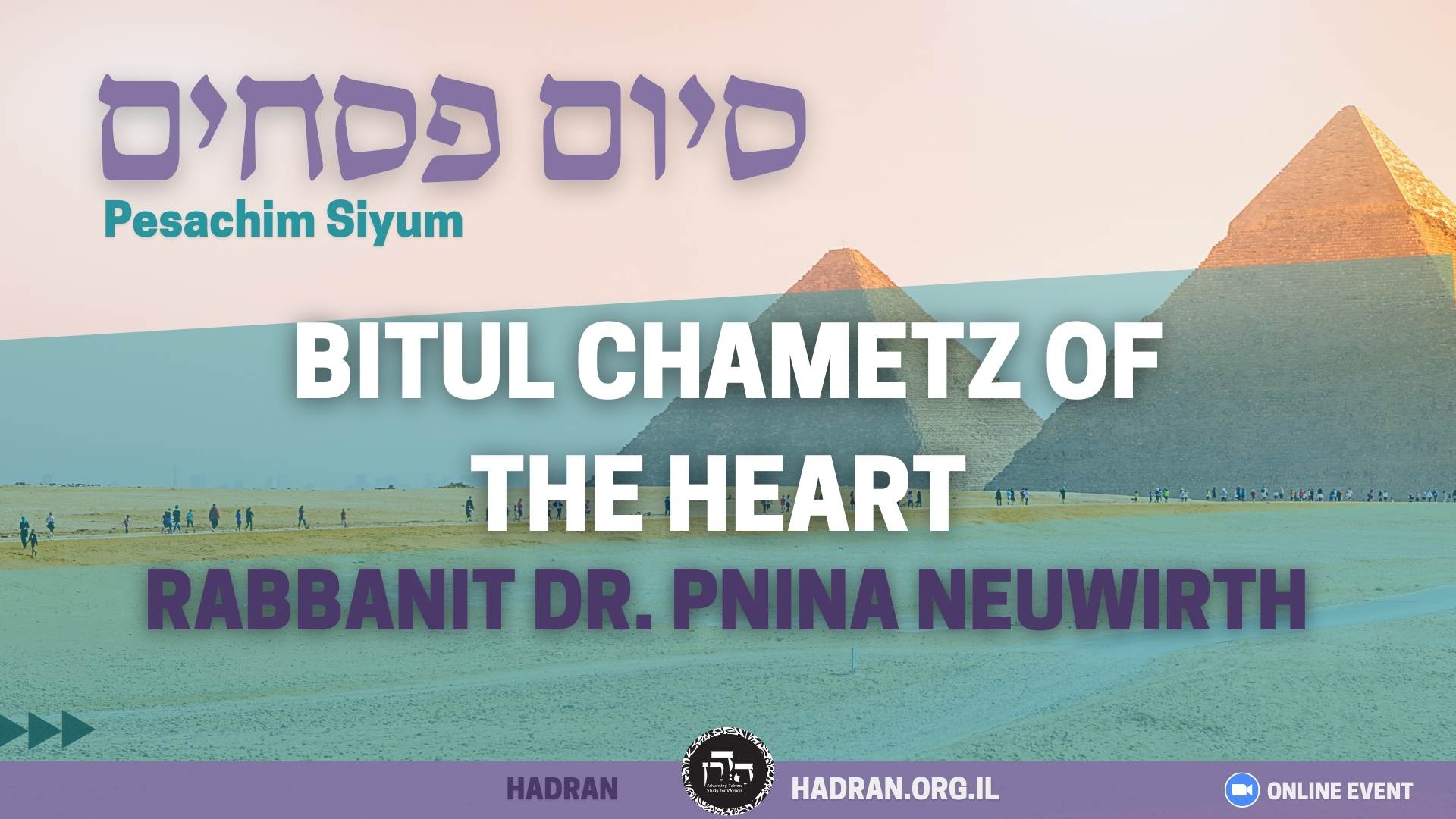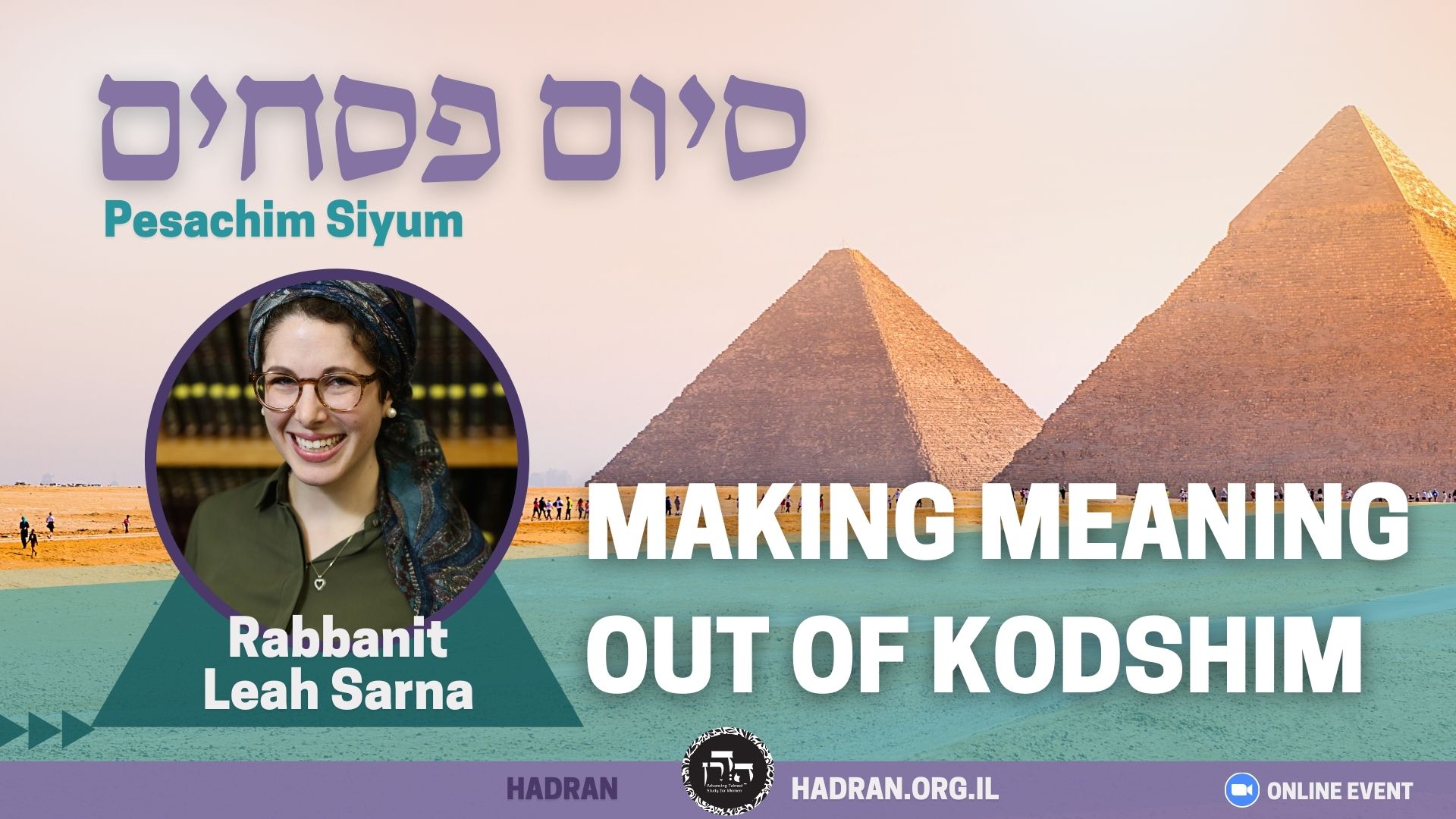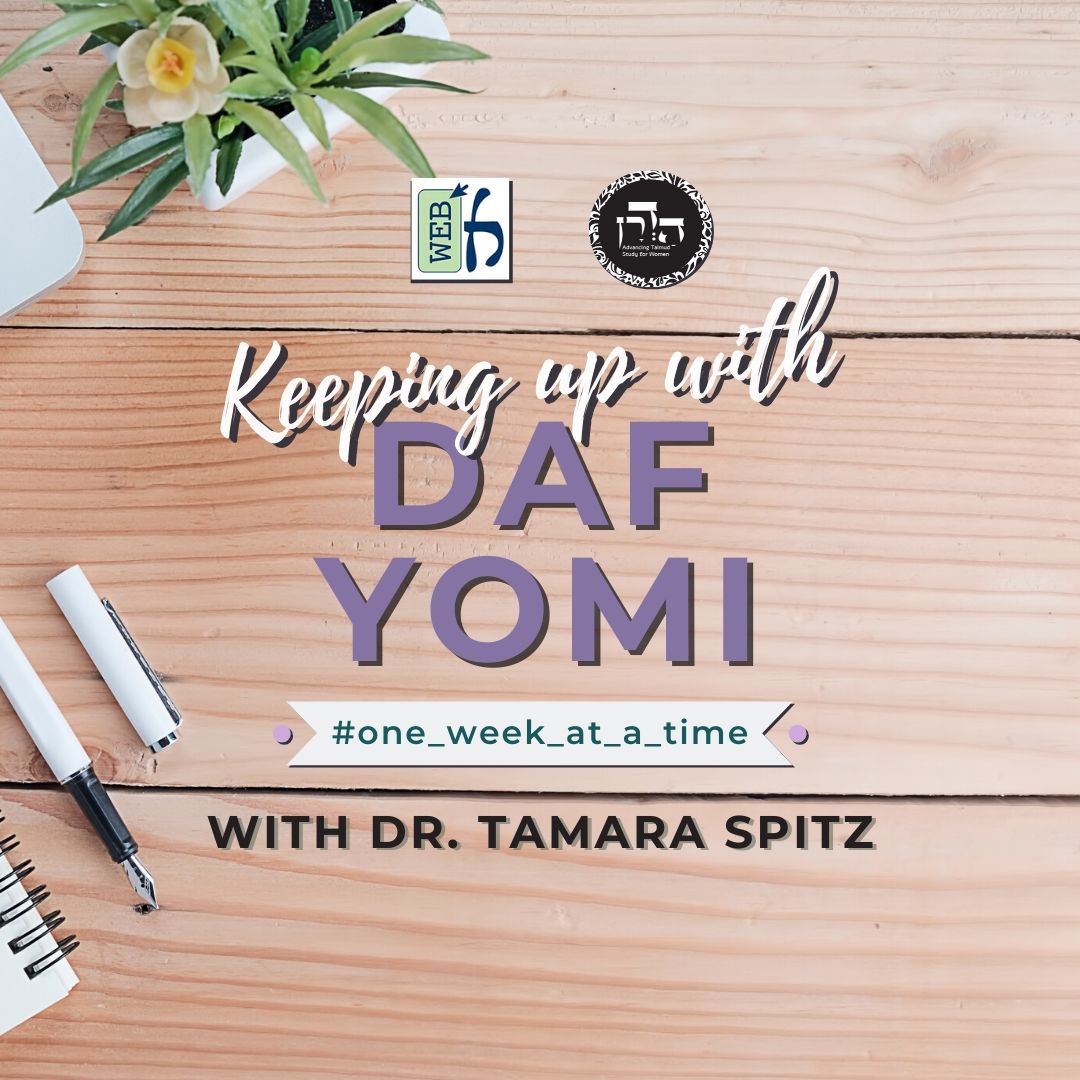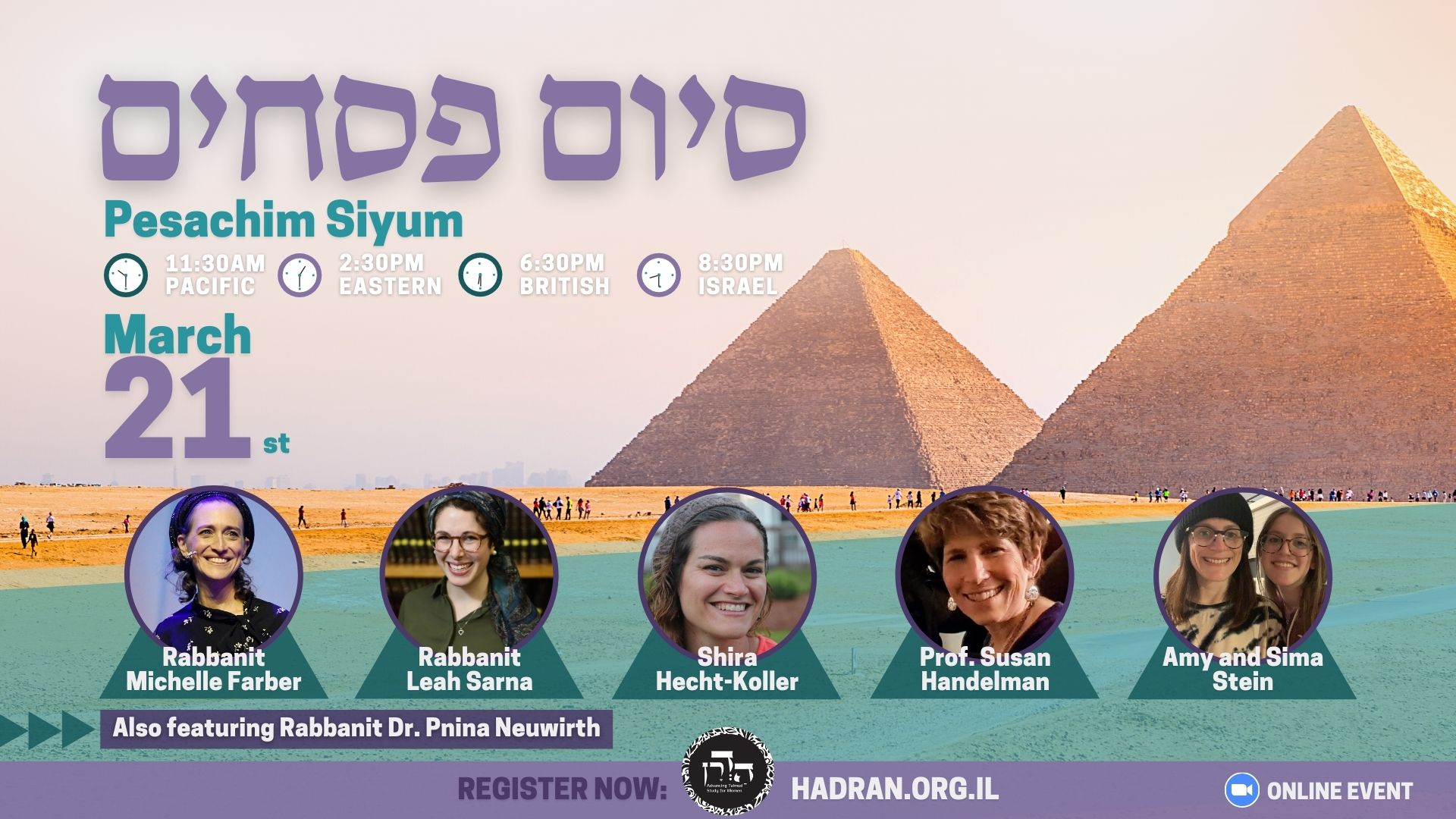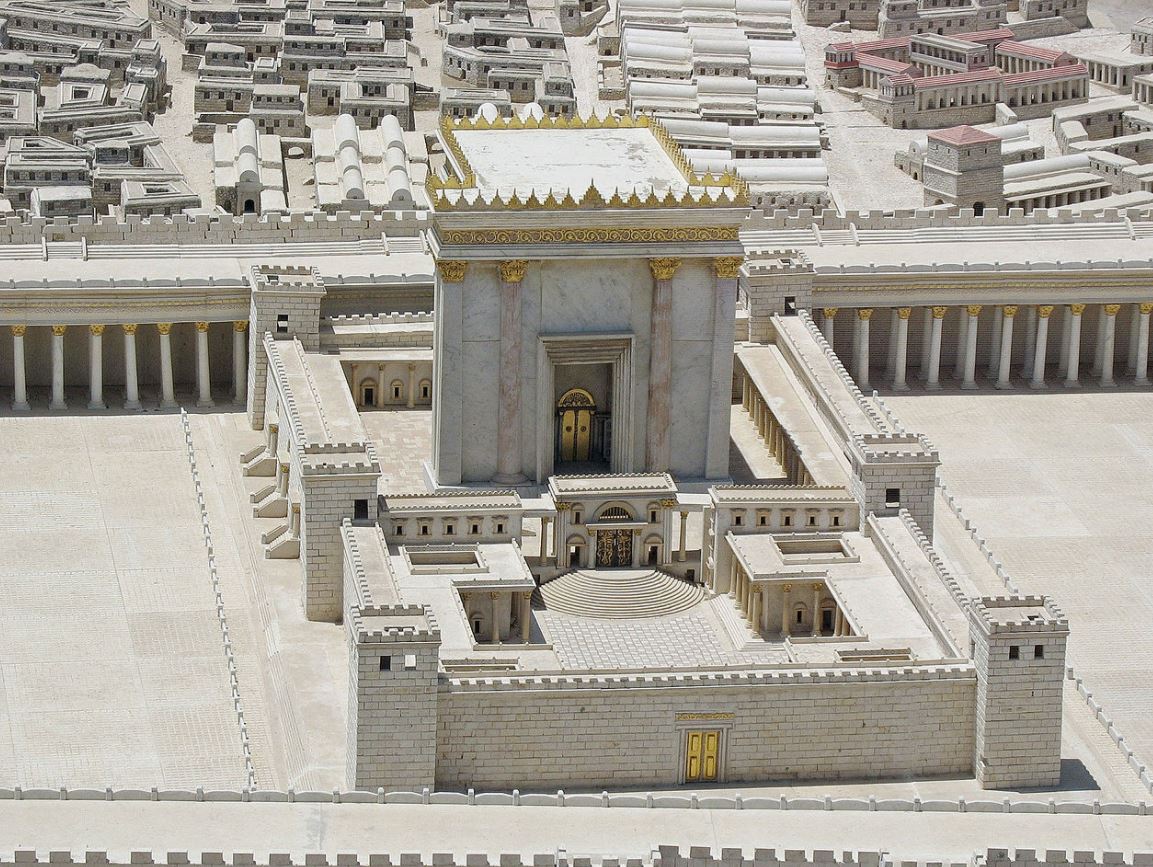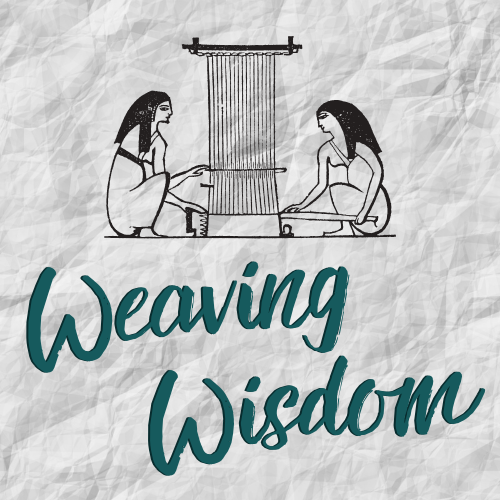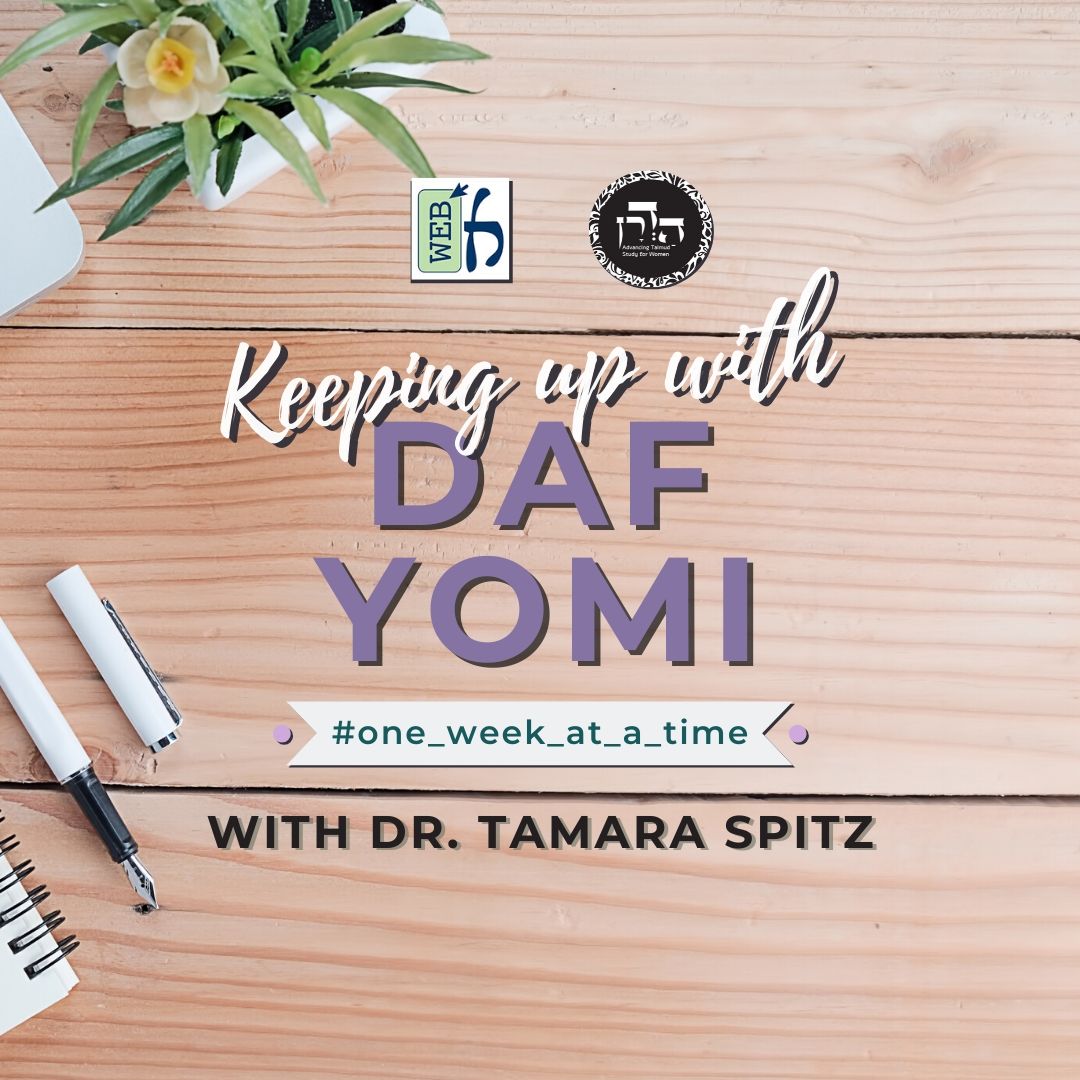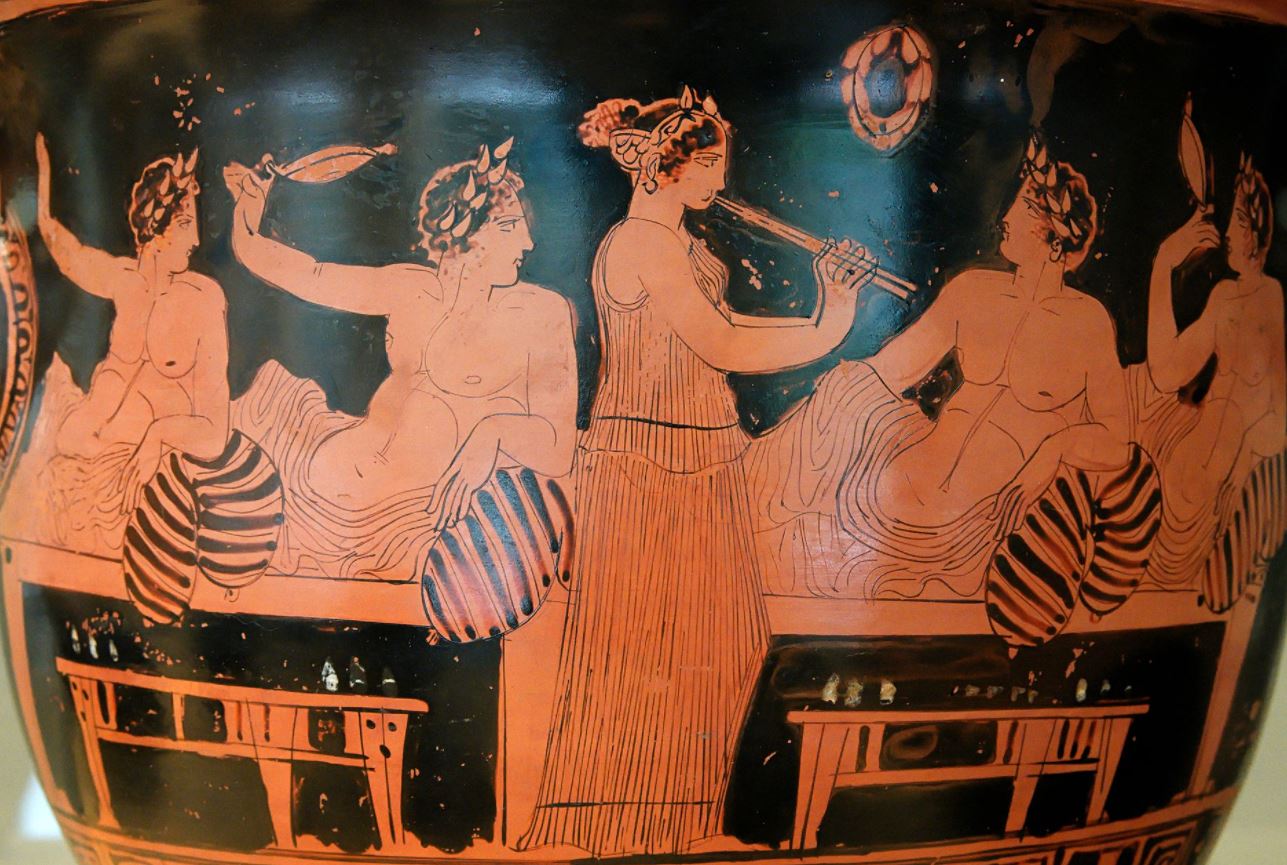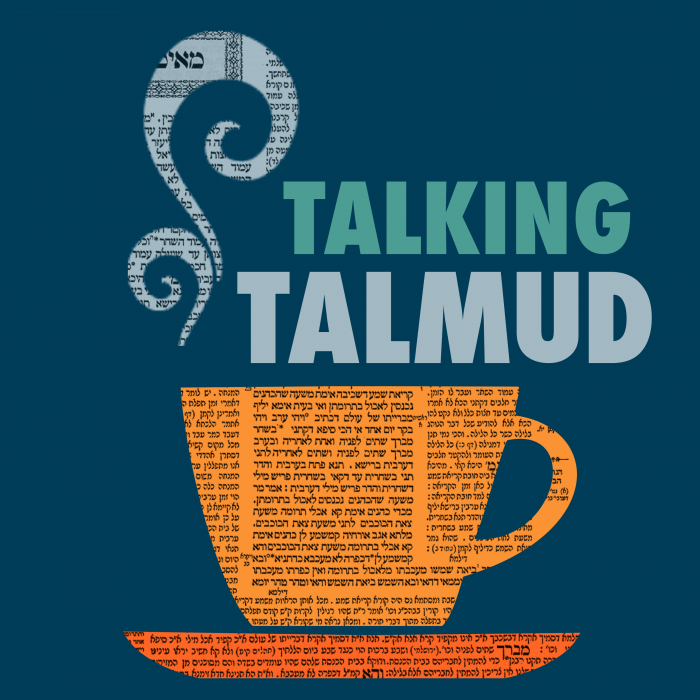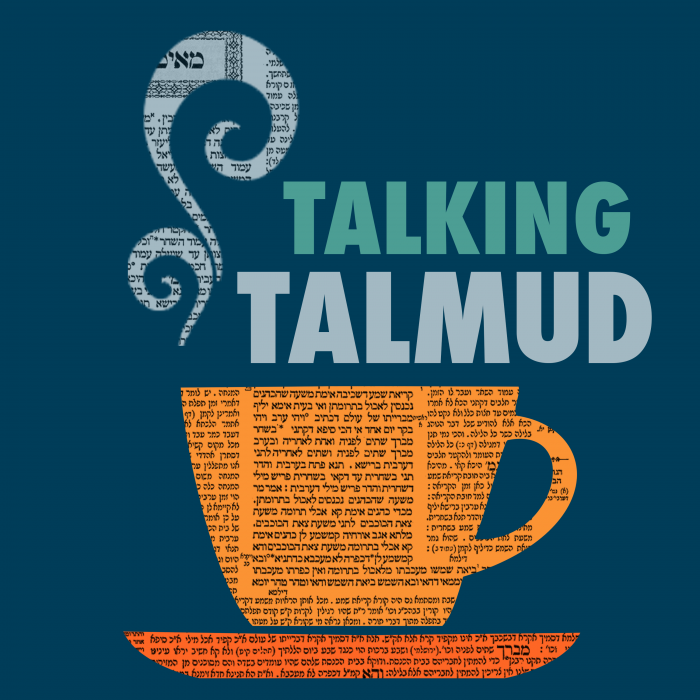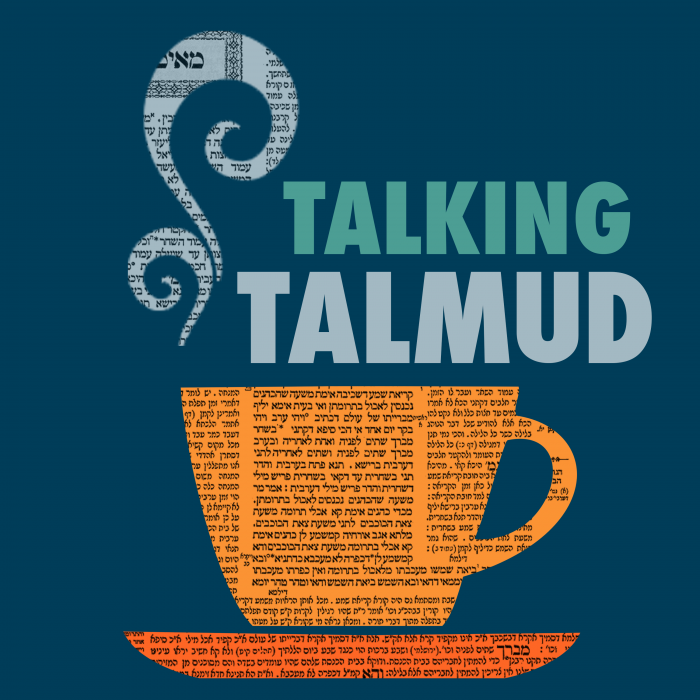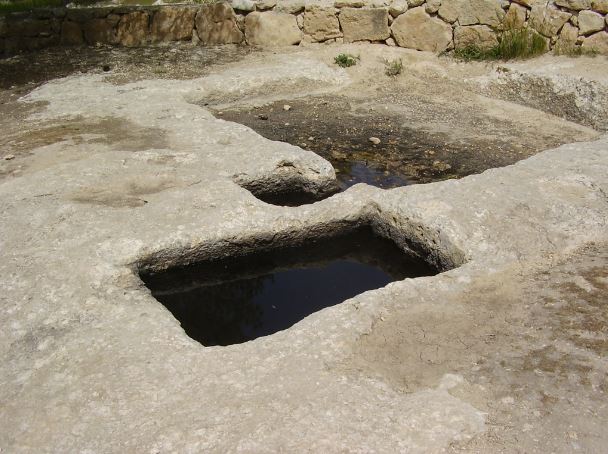Pesachim 82
חוֹזֵר וְשׂוֹרְפוֹ לִפְנֵי הַבִּירָה מֵעֲצֵי הַמַּעֲרָכָה!
he must return and burn it before the Temple with wood from the arrangement. The mishna’s formulation uses the word remembered, implying that not only a large piece of meat that became ritually impure or somehow disqualified, but even a piece that is so small that it could become forgotten, must be burnt with wood from the arrangement.
אָמַר רַב חָמָא בַּר עוּקְבָא: לָא קַשְׁיָא, כָּאן — בְּאַכְסְנַאי. כָּאן — בְּבַעַל הַבַּיִת.
Rav Ḥama bar Ukva said: It is not difficult. Here, where it is stated that one burns it in the Temple with wood from the arrangement, it is referring to a visitor who does not live in Jerusalem or have wood there, and he may therefore use wood from the arrangement. While there, where it is stated that one burns it at home with one’s own wood, it is referring to a resident of Jerusalem.
רַב פָּפָּא אָמַר: הָא וְהָא בְּאַכְסְנַאי, כָּאן — שֶׁהֶחְזִיק בַּדֶּרֶךְ, כָּאן — שֶׁלֹּא הֶחְזִיק בַּדֶּרֶךְ.
Rav Pappa said: This case and that case both refer to a visitor. Here, where it is stated that one may use wood from the arrangement, it is referring to one who already set out on the road, and it is difficult for him to collect wood. There, where it is stated that one must use his own wood, it is referring to a case in which the visitor has not yet set out on the road, and he can gather his own wood.
רַב זְבִיד אָמַר: לְעוֹלָם כִּדְאָמַר מֵעִיקָּרָא — כָּאן בְּאַכְסְנַאי כָּאן בְּבַעַל הַבַּיִת, וְאַף עַל גַּב דְּלָא הֶחְזִיק בַּדֶּרֶךְ, אַכְסְנַאי כֵּיוָן דְּלֵית לֵיהּ עֲשָׂאוּהוּ כְּצִיקָנִין. דִּתְנַן: הַצִּיקָנִין שׂוֹרְפִין אוֹתוֹ לִפְנֵי הַבִּירָה בִּשְׁבִיל לֵיהָנוֹת מֵעֲצֵי הַמַּעֲרָכָה.
Rav Zevid disagreed with Rav Pappa and clarified Rav Ḥama bar Ukva’s opinion. He said: Actually, it can be explained as Rav Ḥama initially said: Here, it is referring to a visitor; there, it is referring to a resident. And even though he did not yet set out on the road, a visitor may use wood from the arrangement for the following reason: Since he does not have his own wood, the Sages treated him like the misers, as we learned in a mishna: The misers burn it before the Temple in order to benefit from the wood of the arrangement. This indicates that anyone who is unconcerned about his reputation, like a miser, may use wood from the arrangement, and this is not considered to be a misuse of consecrated property. Similarly, the Sages also permitted a visitor to use wood from the arrangement.
תָּנוּ רַבָּנַן: בָּאוּ לְשׂוֹרְפוֹ בְּחַצְרוֹתֵיהֶן וּמֵעֲצֵי הַמַּעֲרָכָה — אֵין שׁוֹמְעִין לָהֶן. לִפְנֵי הַבִּירָה וּמֵעֲצֵי עַצְמָן — אֵין שׁוֹמְעִין לָהֶן.
The Sages taught in the Tosefta: If individuals came and wanted to burn the Paschal lamb that had become ritually impure in their courtyards and wanted to take wood from the arrangement to use for this purpose, one does not listen to them. Similarly, if they wanted to burn it before the Temple with their own wood, one does not listen to them.
בִּשְׁלָמָא מֵעֲצֵי הַמַּעֲרָכָה בְּחַצְרוֹתֵיהֶן אֵין שׁוֹמְעִין לָהֶן — דִּילְמָא פָּיְישָׁן מִינַּיְיהוּ, וְאָתוּ בְּהוּ לִידֵי תַקָּלָה. אֶלָּא לִפְנֵי הַבִּירָה מֵעֲצֵי עַצְמָן, מַאי טַעְמָא לָא?
The Gemara asks: Granted, if people want to burn it with wood from the arrangement in their own courtyards one does not listen to them. This is because the Sages were concerned lest they leave over some of the wood they took to burn the Paschal lamb and come to experience a mishap with it by using the wood for another purpose. But in the case in which they wanted to burn the offering before the Temple with their own wood, what is the reason one does not listen to them?
רַב יוֹסֵף אָמַר: שֶׁלֹּא לְבַיֵּישׁ אֶת מִי שֶׁאֵין לוֹ. רָבָא אָמַר: מִפְּנֵי הַחֲשָׁד.
Rav Yosef said: It is in order not to embarrass one who does not have the means to bring his own wood. If it were permitted to bring one’s own wood to burn in the Temple, people would realize that only the poor people take wood from the Temple. This would be embarrassing to the poor. Rava said: It is due to suspicion. People would take back their own unused wood that they had brought, and others might suspect that they were stealing consecrated wood from the Temple.
מַאי בֵּינַיְיהוּ? אִיכָּא בֵּינַיְיהוּ דְּאַיְיתִי קְנֵי וְחַרְיָוָתָא, דְּלָא חֲזֵי לַמַּעֲרָכָה.
The Gemara asks: What is the practical difference between these two answers? The Gemara answers: The practical difference between them is the case of one who brings reeds or palm branches that are not fit for the arrangement. Since these types of branches are not used for the arrangement of wood on the altar, there is no concern that people would be wrongly suspected of stealing them from the Temple; therefore, Rava would permit it. However, the concern that the poor will be embarrassed is still relevant, and so Rav Yosef would prohibit it.
תְּנַן הָתָם: רֹאשׁ הַמַּעֲמָד הָיָה מַעֲמִיד אֶת הַטְּמֵאִין עַל שַׁעַר הַמִּזְרָח. מַאי טַעְמָא? אָמַר רַב יוֹסֵף: כְּדֵי לְבַיְּישָׁן. רָבָא אָמַר: מִפְּנֵי הַחֲשָׁד.
Another mishna teaches a similar dispute between Rav Yosef and Rava on a different subject: We learned in a mishna there, in tractate Tamid: The head of the watch would stand the ritually impure priests at the entrance to the eastern gate each morning. The Gemara asks: What is the reason that they did not simply send them home without making them stand at the entrance to the eastern gate? Rav Yosef said: It was in order to embarrass them for not having been careful to avoid becoming impure. Rava said: They would stand them there to avoid suspicion, so that people would realize that they were not performing the Temple service because they were impure, rather than in order to work in their regular professions.
מַאי בֵּינַיְיהוּ? אִיכָּא בֵּינַיְיהוּ מְפַנְּקִי, אִי נָמֵי דְּקָא גָדֵיל שִׁישׁוּרָא.
The Gemara asks: What is the practical difference between these two opinions? The Gemara answers: The practical difference between them is the case of pampered people who never work, whom others would not suspect of avoiding Temple service in order to work in their regular professions. Alternatively, it is the case of one who twists ropes for a living. No one would suspect someone of missing the Temple service in order to work in such a lowly and non-profitable occupation. These two categories of people would not have to stand at the gate according to Rava’s opinion, but would have to according to Rav Yosef’s opinion.
מַתְנִי׳ הַפֶּסַח שֶׁיָּצָא אוֹ שֶׁנִּטְמָא — יִשָּׂרֵף מִיָּד. נִטְמְאוּ הַבְּעָלִים אוֹ שֶׁמֵּתוּ — תְּעוּבַּר צוּרָתוֹ, וְיִשָּׂרֵף בְּשִׁשָּׁה עָשָׂר. רַבִּי יוֹחָנָן בֶּן בְּרוֹקָה אוֹמֵר: אַף זֶה יִשָּׂרֵף מִיָּד לְפִי שֶׁאֵין לוֹ אוֹכְלִין.
MISHNA: A Paschal lamb that was taken out of its permissible area or that became ritually impure should be burned immediately on the eve of Passover. If the owners became ritually impure or died, its form must be allowed to decay by leaving it for a period of time instead of burning it immediately, and it should be burned on the sixteenth of Nisan, immediately after the first day of the Festival. Rabbi Yoḥanan ben Beroka says: This, too, should be burned immediately, because it has no one to eat it, which is also so severe a disqualification that decay of form is not required.
גְּמָ׳ בִּשְׁלָמָא טָמֵא, כְּתִיב: ״וְהַבָּשָׂר אֲשֶׁר יִגַּע בְּכׇל טָמֵא לֹא יֵאָכֵל בָּאֵשׁ יִשָּׂרֵף״. אֶלָּא יוֹצֵא מְנָלַן?
GEMARA: The Gemara asks: Granted, the fact that ritually impure sacrificial meat must be burned is written in the Torah, as it says: “The flesh that touches any impure item shall not be eaten, it shall be burned in fire” (Leviticus 7:19). But sacrificial meat that is taken out of its permissible area, from where do we derive that it must be burned?
דִּכְתִיב: ״הֵן לֹא הוּבָא אֶת דָּמָהּ אֶל הַקֹּדֶשׁ פְּנִימָה״. אָמַר לוֹ מֹשֶׁה לְאַהֲרֹן: מַדּוּעַ לֹא אֲכַלְתֶּם אֶת הַחַטָּאת? שֶׁמָּא נִכְנַס דָּמָהּ לִפְנַי וְלִפְנִים. אָמַר לוֹ: לָאו.
The Gemara responds: It is derived from the verses describing Moses admonishing Aaron and his sons about the fact that they did not eat the sin-offering on the eighth day of inauguration, as it is written: “Behold, its blood was not brought into the Sanctuary within; you should have eaten it in the Sanctuary, as I commanded” (Leviticus 10:18). This should be understood as follows: Moses said to Aaron: Why didn’t you eat the sin-offering? Perhaps its blood entered the innermost chamber, the Sanctuary, in which case it must be burned? Aaron said to him: No.
אָמַר לוֹ: שֶׁמָּא חוּץ לִמְחִיצָתָהּ יָצְתָה? אָמַר לוֹ: לָאו, בַּקּוֹדֶשׁ הָיְתָה. אָמַר לוֹ: אִי בַּקּוֹדֶשׁ הָיְתָה וְ״הֵן לֹא הוּבָא אֶת דָּמָהּ אֶל הַקֹּדֶשׁ פְּנִימָה״, מַדּוּעַ לֹא אֲכַלְתֶּם אוֹתָהּ? מִכְּלָל דְּאִי נָפְקָא, אִי נָמֵי עָיֵיל דָּמָהּ לִפְנִים — בַּת שְׂרֵיפָה הִיא.
Moses said to him: Perhaps it was taken outside of its boundary, and that is the reason you did not eat it? He said to him: No, it was in the sacred area, i.e., the courtyard. Moses said to him: If it was in the sacred area the entire time, behold, its blood was not brought into the Sanctuary within, why didn’t you eat it? This proves by inference that if it leaves its boundary, or alternatively, if its blood enters within the Sanctuary of the Temple, it must be burned. This can serve as a model for all offerings.
בִּשְׁלָמָא נִטְמָא, גַּלִּי רַחֲמָנָא בְּקָדָשִׁים קַלִּים, כׇּל שֶׁכֵּן בְּקׇדְשֵׁי קָדָשִׁים. אֶלָּא יוֹצֵא, אַשְׁכְּחַן קׇדְשֵׁי הַקֳּדָשִׁים, קָדָשִׁים קַלִּים מְנָלַן? וְתוּ, הָא דְּתַנְיָא: לָן דָּמָהּ,
The Gemara asks: Granted, with regard to sacrificial meat that became ritually impure, the Merciful One reveals that halakha in the Torah with regard to offerings of lesser sanctity, as the verse: “The flesh that touches any impure item shall not be eaten,” is referring to a peace-offering, and it applies all the more so with regard to offerings of the most sacred order. However, with regard to sacrificial meat that is taken out of its boundary, we have found a source that this applies to offerings of only the most sacred order. With regard to offerings of lesser sanctity, such as the Paschal lamb, from where do we derive that they too must be burned? And furthermore, with regard to that which is taught in a baraita: If the blood of an offering was left overnight instead of being sprinkled on the altar on the day it was slaughtered,
נִשְׁפַּךְ דָּמָהּ, יָצָא דָּמָהּ חוּץ לַקְּלָעִים — דְּקַיְימָא לַן בִּשְׂרֵיפָה, מְנָלַן?
or its blood was spilled, or its blood was taken outside the hangings that denoted the courtyard of the Tabernacle, we maintain that it must be burned; from where do we derive this halakha?
נָפְקָא לַן מִדְּרַבִּי שִׁמְעוֹן. דְּתַנְיָא, רַבִּי שִׁמְעוֹן אוֹמֵר: ״בַּקֹּדֶשׁ בָּאֵשׁ תִּשָּׂרֵף״ — לִימֵּד עַל חַטָּאת שֶׁשְּׂרֵיפָתָהּ בַּקּוֹדֶשׁ.
The Gemara answers: We derive it from the exposition of Rabbi Shimon, as it was taught in a baraita that Rabbi Shimon says: The verse that states: “Any sin-offering from which some blood has been brought to the Tent of Meeting, to make atonement in the sacred place, shall not be eaten; it shall be burned in fire” (Leviticus 6:23), has taught that the burning of a sin-offering is in the sacred area, the Temple courtyard.
אֵין לִי אֶלָּא זוֹ בִּלְבַד, שְׁאָר פְּסוּלֵי קׇדְשֵׁי קָדָשִׁים וְאֵימוּרֵי קָדָשִׁים קַלִּים מִנַּיִן? תַּלְמוּד לוֹמַר: ״(וְכׇל) … בַּקֹּדֶשׁ … בָּאֵשׁ תִּשָּׂרֵף״.
I have derived only that the halakha applies to this alone, a sin-offering; with regard to the rest of the disqualified offerings of the most sacred order and the portions of offerings of lesser sanctity that are consumed on the altar, from where do we derive that they must be burned in the Temple courtyard, which is their boundary when they are valid? The verse states: “Any…in the sacred place…shall be burned in fire,” which teaches that any consecrated item must be burned in a sacred place.
אַשְׁכְּחַן קׇדְשֵׁי קָדָשִׁים, קָדָשִׁים קַלִּים מְנָלַן? אֶלָּא: כׇּל פְּסוּלוֹ בַּקֹּדֶשׁ בִּשְׂרֵיפָה, לָא שְׁנָא קָדָשִׁים קַלִּים וְלָא שְׁנָא קׇדְשֵׁי קָדָשִׁים — גְּמָרָא גְּמִירִי לַהּ, וְחַטָּאת דְּאַהֲרֹן מִשּׁוּם מַעֲשֶׂה שֶׁהָיָה כָּךְ הָיָה.
The Gemara asks further: We found a source for offerings of the most sacred order; from where do we derive that it also applies to offerings of lesser sanctity? Rather, we must say as follows: Anything disqualified in the sacred area, the Temple courtyard, must be burned. It is no different whether it is offerings of lesser sanctity, and it is no different whether it is offerings of the most sacred order; they learned it as a tradition. And the sin-offering of Aaron that was burned on the eighth day of inauguration was mentioned only because the incident that took place, took place in this way. It was not mentioned in order to teach the halakhot of offerings.
וּלְתַנָּא דְּבֵי רַבָּה בַּר אֲבוּהּ, דְּאָמַר: אֲפִילּוּ פִּיגּוּל טָעוּן עִיבּוּר צוּרָה. מְנָא לַן?
The Gemara proceeds to ask an unrelated question with regard to piggul: And according to the opinion of the tanna from the school of Rabba bar Avuh, who said that even piggul, which is a disqualification of the animal itself, requires decay of form, meaning that it must be left over until the next day so that it will begin to decay and is only then burned, from where do we derive that it requires decay of form?
יָלֵיף ״עָוֹן״ ״עָוֹן״ מִנּוֹתָר.
The Gemara answers: It is derived from a verbal analogy from the parallel words “iniquity” and “iniquity.” With regard to piggul, the verse states: “It remains rejected [piggul]; and the soul that eats it shall bear its iniquity” (Leviticus 7:18), and with regard to leftover sacrificial meat, the verse states: “And whatever is leftover…shall be burned in fire…and each of those who eat it shall bear his iniquity” (Leviticus 19:6–8). Just as leftover sacrificial meat is burned after it has been left over to the next day, so too, piggul is burned only after it has been left over to the next day and its form has decayed.
וְנֵילַף ״עָוֹן״ ״עָוֹן״ מֵחַטָּאת דְּאַהֲרֹן! אָמַר לָךְ: חַטָּאת דְּאַהֲרֹן כִּי הַאי גַוְונָא נָמֵי עִיבּוּר צוּרָה לְדוֹרוֹת בָּעֲיָא, וְהָתָם — הוֹרָאַת שָׁעָה הָיְתָה.
The Gemara asks: Let us instead learn the rules of piggul through a verbal analogy based on the parallel words “iniquity” and “iniquity” from the sin-offering of Aaron, with regard to which the verse states: “Why did you not eat the sin-offering in the place of sanctity…and He gave it to you to bear the iniquity of the congregation” (Leviticus 10:17). The sin-offering of Aaron was burned immediately, without decay of form, so why can it not be learned from there that piggul does not require decay of form either? That tanna could have said to you: The sin-offering of Aaron in a case like this would also require decay of form were it to occur in future generations; but there, when it was burned immediately, it was a provisional edict issued in exigent circumstances.
הַשְׁתָּא דְּאָמְרִינַן כָּל פְּסוּלֵי דְקֹדֶשׁ בִּשְׂרֵיפָה, לָא שְׁנָא דְּקׇדְשֵׁי קָדָשִׁים וְלָא שְׁנָא קָדָשִׁים קַלִּים, גְּמָרָא גְּמִירִי לַהּ, ״בַּקֹּדֶשׁ … בָּאֵשׁ תִּשָּׂרֵף״ לְמָה לִי? הָהוּא מִבְּעֵי לֵיהּ שֶׁשְּׂרֵיפָתָהּ בַּקֹּדֶשׁ.
The Gemara asks: Now that we say that we have accepted the conclusion that all disqualified sacred offerings must be burned, and it is no different whether they are disqualified offerings of the most sacred order or offerings of lesser sanctity, because in both cases they learned it as a tradition, with regard to the verse that says: “In the sacred place…shall be burned in fire,” why do I need it? What does this verse teach that is not known from oral tradition? The Gemara answers: That verse is required to teach that the requirement of burning that is learned from the oral tradition cannot take place anywhere; its burning must take place only in the sacred place, the Temple courtyard.
״וְהַבָּשָׂר אֲשֶׁר יִגַּע בְּכׇל טָמֵא לֹא יֵאָכֵל בָּאֵשׁ יִשָּׂרֵף״, לְמָה לִי?
The Gemara asks further: If the source of the halakha is an oral tradition, with regard to the verse that states: “The flesh that touches any impure item shall not be eaten, it shall be burned in fire” (Leviticus 7:19), why do I need it? This halakha is included in the oral tradition and should not require its own verse.
הַהוּא, לְגוּפֵיהּ אִיצְטְרִיךְ. סָלְקָא דַּעְתָּךְ אָמֵינָא כֹּל פְּסוּלֵי דְקֹדֶשׁ, כְּגוֹן: לָן דָּמָהּ, וְנִשְׁפַּךְ דָּמָהּ, וְיָצָא דָּמָהּ, וְנִשְׁחֲטָה בַּלַּיְלָה, דְּבִשְׂרֵיפָה דְּלֵיתַנְהוּ בְּחוּלִּין.
The Gemara answers: That verse is necessary for itself. It could enter your mind to say that disqualified sacred offerings include only a case where its blood was left overnight instead of being sprinkled on the altar on the day the offering was slaughtered; or its blood was spilled; or its blood was taken outside the hangings; and similarly, the case of an offering that was slaughtered at night. In all these cases, the offering must be burned because these are disqualifications unique to sanctified offerings that do not exist with regard to unconsecrated items.
אֲבָל נִטְמָא, דִּבְחוּלִּין נָמֵי מִפְּסִיל, אֵימָא הוֹאִיל וְאִיתְעֲבִיד בֵּיהּ עוֹבָדִין דְּחוֹל — אֵימָא לָא תִּיבְּעֵי שְׂרֵיפָה, וְתִיסְגֵּי לֵיהּ בִּקְבוּרָה, קָא מַשְׁמַע לַן.
But if the meat became ritually impure, which disqualifies unconsecrated meat also, say that since it was treated in the manner of unconsecrated items, as the disqualification is not unique to consecrated items, it should not require burning, and burial should be sufficient for it. Therefore, the verse teaches us that an offering that is disqualified through ritual impurity must also be burned.
נִטְמְאוּ הַבְּעָלִים אוֹ שֶׁמֵּתוּ תְּעוּבַּר צוּרָתָן וְכוּ׳. אָמַר רַב יוֹסֵף: מַחְלוֹקֶת שֶׁנִּטְמְאוּ בְּעָלִים אַחַר זְרִיקָה, דְּאִיתְחֲזִי בָּשָׂר לַאֲכִילָה. אֲבָל נִטְמְאוּ בְּעָלִים לִפְנֵי זְרִיקָה, דְּלָא אִיתְחֲזִי בָּשָׂר לַאֲכִילָה — דִּבְרֵי הַכֹּל יִשָּׂרֵף מִיָּד.
It was taught in the mishna that if the owners of the offering became ritually impure or died before the offering was completed, its form must be left to decay, and it is burned after the first day of the Festival. Rabbi Yoḥanan ben Beroka disagrees and says that it is burned immediately. Rav Yosef said: This dispute is about a case in which the owners became ritually impure after the sprinkling of the blood, because the meat was fit for eating since all its services were completed in a valid way. But if the owners became ritually impure before the sprinkling of the blood, such that the meat was not fit for eating even for a moment, all agree that it should be burned immediately.
מֵיתִיבִי, זֶה הַכְּלָל: כׇּל שֶׁפְּסוּלוֹ בְּגוּפוֹ — יִשָּׂרֵף מִיָּד. בַּדָּם וּבַבְּעָלִים — תְּעוּבַּר צוּרָתוֹ וְיֵצֵא לְבֵית הַשְּׂרֵיפָה.
The Gemara raises an objection to this statement based on the Tosefta: This is the principle: In all cases in which its disqualification is in itself, it should be burned immediately. If the disqualification is in the blood of the offering or in the owners, its form should be left to decay, and then it should be taken out to the place designated for burning.
קָתָנֵי בְּעָלִים דּוּמְיָא דְּדָם: מָה דָּם לִפְנֵי זְרִיקָה, אַף בְּעָלִים לִפְנֵי זְרִיקָה.
The following inference can be made based on the formulation of the Tosefta: It is teaching that the case of disqualified owners is similar to the case of disqualified blood: Just as in the case of blood the disqualification necessarily occurred before the sprinkling of the blood, as the offering is not disqualified if anything happens to the blood after sprinkling, so too, the case of owners is referring to one in which they became disqualified even before the sprinkling of the blood, which contradicts the statement of Rav Yosef.
אֶלָּא אִי אִיתְּמַר, הָכִי אִיתְּמַר: מַחְלוֹקֶת שֶׁנִּטְמְאוּ בְּעָלִים לִפְנֵי זְרִיקָה, דְּלָא אִיתְחֲזִי בָּשָׂר לַאֲכִילָה, דְּהָוֵה לֵיהּ כִּפְסוּלוֹ בְּגוּפוֹ. אֲבָל נִטְמְאוּ בְּעָלִים לְאַחַר זְרִיקָה, דְּאִיתְחֲזִי בָּשָׂר לַאֲכִילָה — דִּבְרֵי הַכֹּל פְּסוּלוֹ מֵחֲמַת דָּבָר אַחֵר, וּבָעֲיָא עִיבּוּר צוּרָה.
Rather, if this was stated in the name of Rav Yosef, it was stated as follows: This dispute is specifically about a case in which the owners became ritually impure before the sprinkling of the blood, such that the meat was never fit for eating, which makes it as though its disqualification is in itself. But if the owners became ritually impure after sprinkling of the blood, such that the meat was fit for eating, all agree that its disqualification is due to a different matter, i.e., an external factor, and it requires decay of form.
וְרַבִּי יוֹחָנָן אָמַר: אַף לְאַחַר זְרִיקָה נָמֵי מַחְלוֹקֶת. וְאַזְדָּא רַבִּי יוֹחָנָן לְטַעְמֵיהּ, דְּאָמַר רַבִּי יוֹחָנָן: רַבִּי יוֹחָנָן בֶּן בְּרוֹקָה וְרַבִּי נְחֶמְיָה אָמְרוּ דָּבָר אֶחָד, רַבִּי יוֹחָנָן בֶּן בְּרוֹקָה הָא דַּאֲמַרַן.
And Rabbi Yoḥanan said: Even a case in which the owners became ritually impure after sprinkling the blood is included in the dispute about whether decay of form is necessary. And Rabbi Yoḥanan follows his line of reasoning, as Rabbi Yoḥanan said: Rabbi Yoḥanan ben Beroka and Rabbi Neḥemya said the same thing. The statement of Rabbi Yoḥanan ben Beroka is that which we said.
רַבִּי נְחֶמְיָה מַאי הִיא? דְּתַנְיָא, רַבִּי נְחֶמְיָה אוֹמֵר: מִפְּנֵי אֲנִינוּת נִשְׂרְפָה זוֹ, לְכָךְ נֶאֱמַר ״כָּאֵלֶּה״.
With regard to Rabbi Neḥemya, what is the ruling in which he expressed his opinion? It is as it was taught in a baraita: Rabbi Neḥemya says: Aaron’s sin-offering that was burned on the eighth day of inauguration was burned due to acute mourning, as that was the day his sons Nadav and Avihu died. For this reason, it is stated that Aaron explained to Moses: “Now that events such as these befell me, were I to eat this day’s sin-offering would the Lord approve?” (Leviticus 10:19). In other words, it was due to the deaths of his sons, which Aaron referred as “events such as these,” that Aaron burned the sin-offering instead of eating it.
וְהָא אֲנִינוּת כִּלְאַחַר זְרִיקָה הָוְיָא, וְכִי אִשְׂתְּרוּף — לְאַלְתַּר (נִשְׂתְּרוּף).
Rabbi Yoḥanan analyzes Rabbi Neḥemya’s statement: Now, acute mourning is similar to a case of disqualification after sprinkling of the blood, because acute mourning merely disqualifies the owners from eating the offering. It does not disqualify the actual performance of the sacrificial service by a High Priest, such as Aaron. Therefore, it is like other disqualifications that take effect after the sprinkling, which simply prohibit the eating of the meat. And when it was burned, it was burned immediately, without waiting until the following day. This shows that Rabbi Neḥemya agrees that an offering that becomes disqualified after its blood has been sprinkled should be burned immediately.



